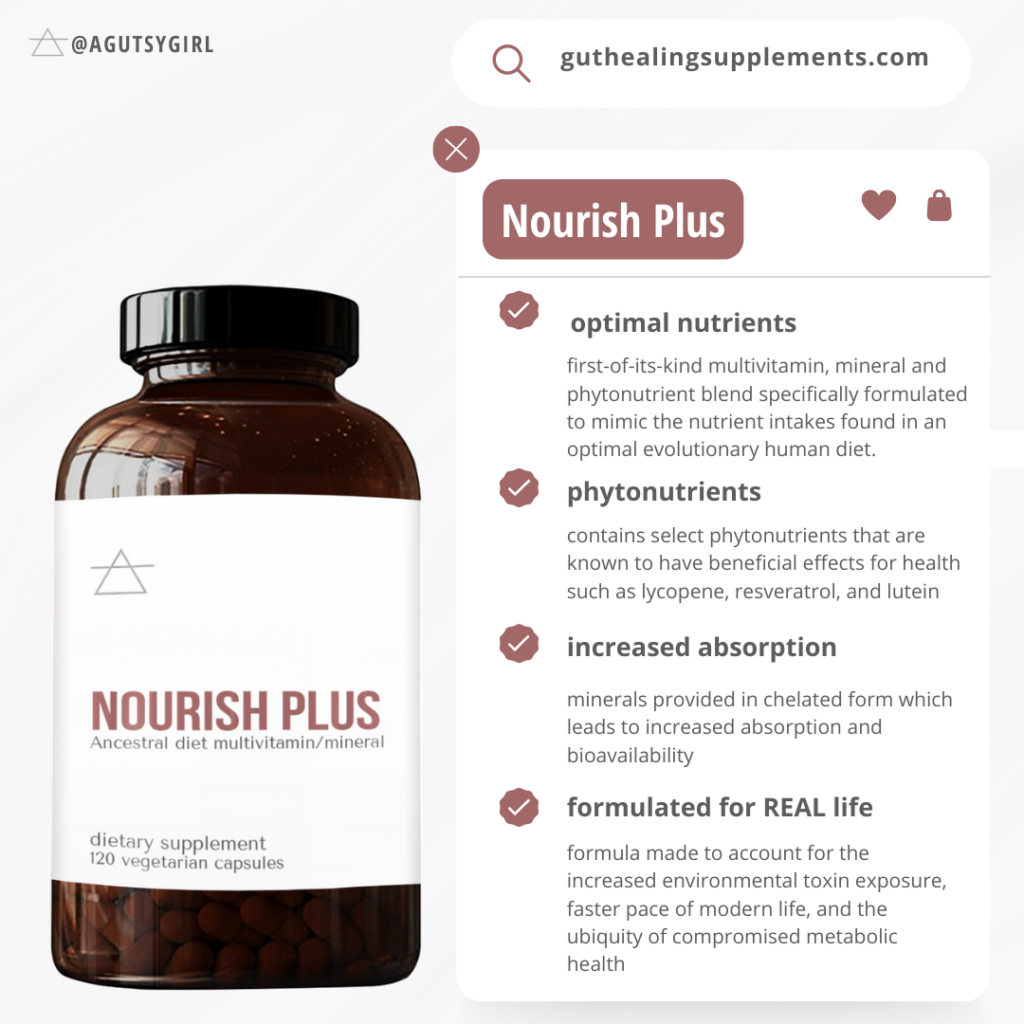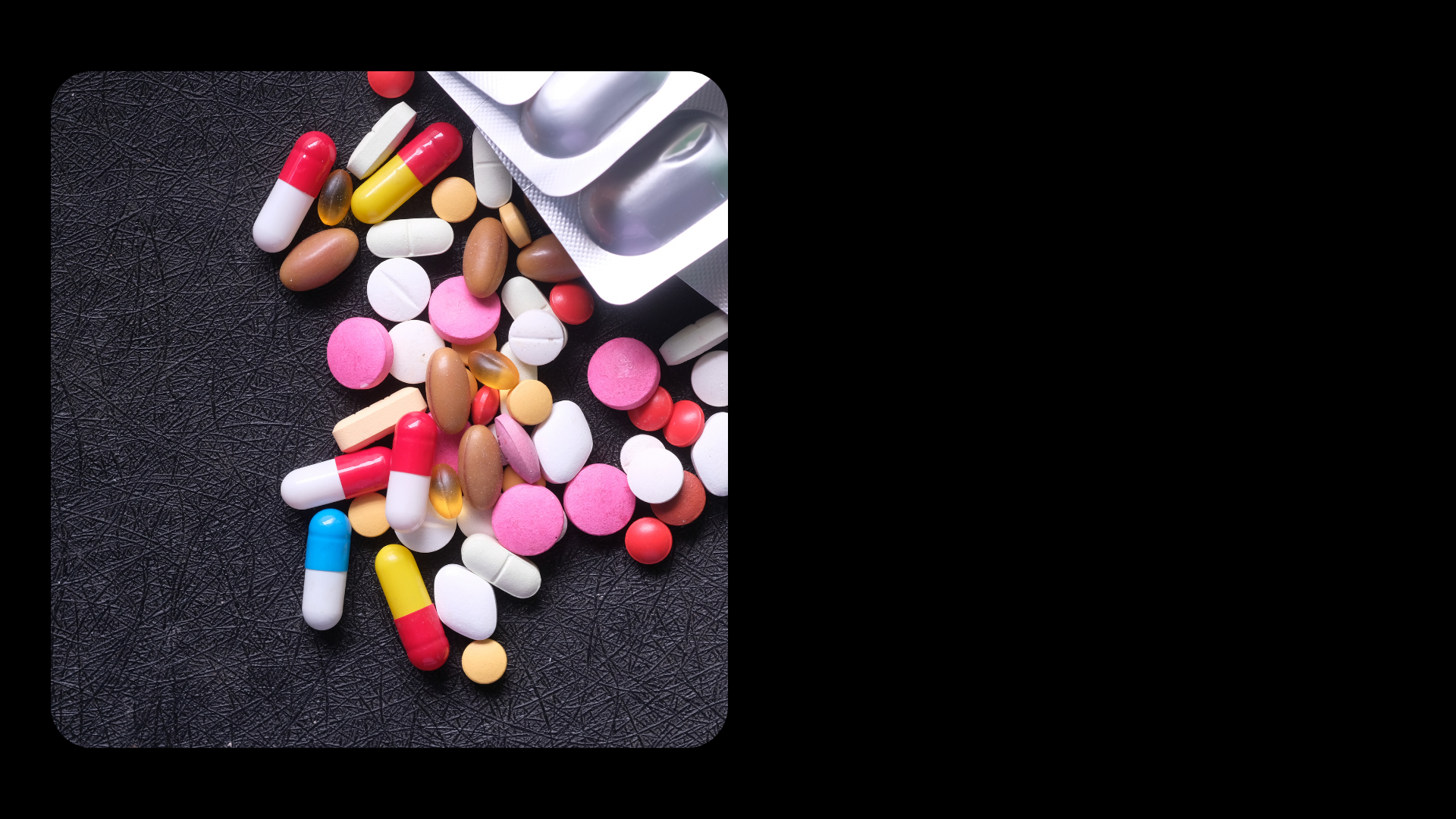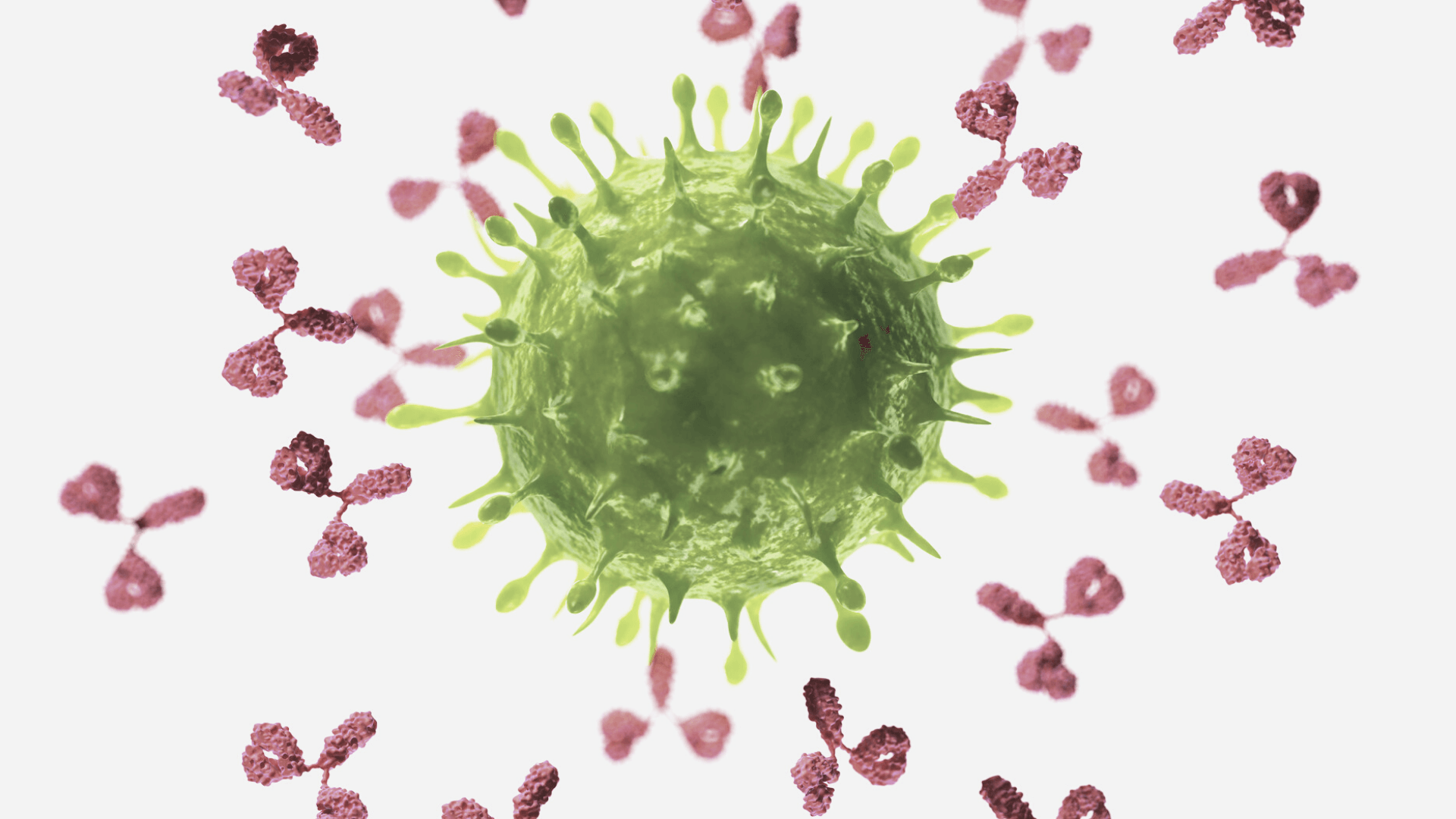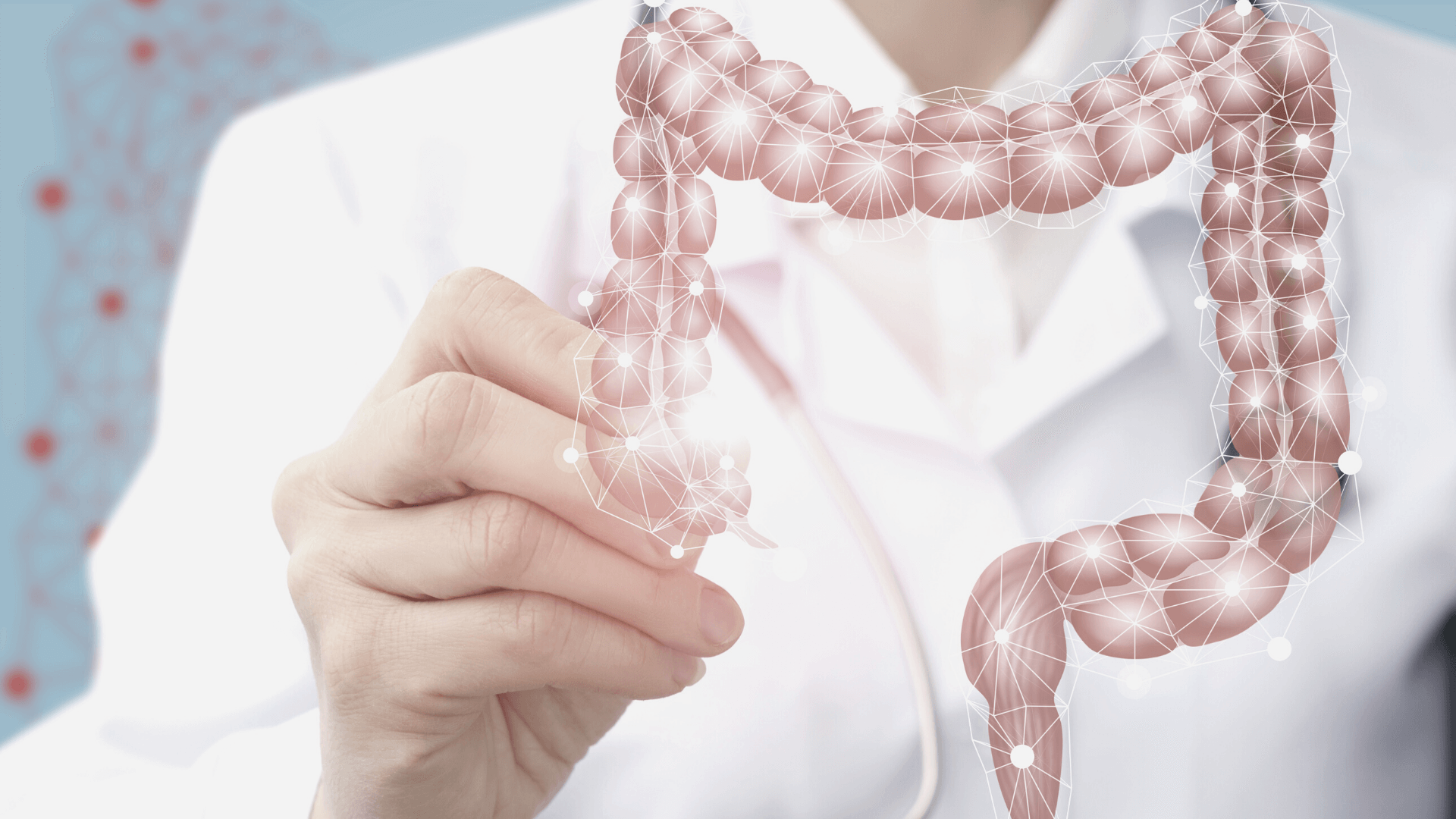Hemorrhoids vs Colon Cancer: yes, the topic at hand for today.
Today’s guest is someone I am extremely honored to have on the show, as he is an expert on all things colorectal health.
Dr. Zuri Murrell is a colorectal surgeon in Los Angeles who specializes in colon cancer and hemorrhoids.
As director of the Cedars-Sinai Colorectal Cancer Center, he is full of knowledge of how to both prevent and treat colorectal cancer.
We are so excited to have him on today!
Hemorrhoids vs Colon Cancer (Episode 88 with Dr. Zuri Murrell)
Click HERE to save this information on hemorrhoids vs colon cancer for later.
Episode 88: Show notes
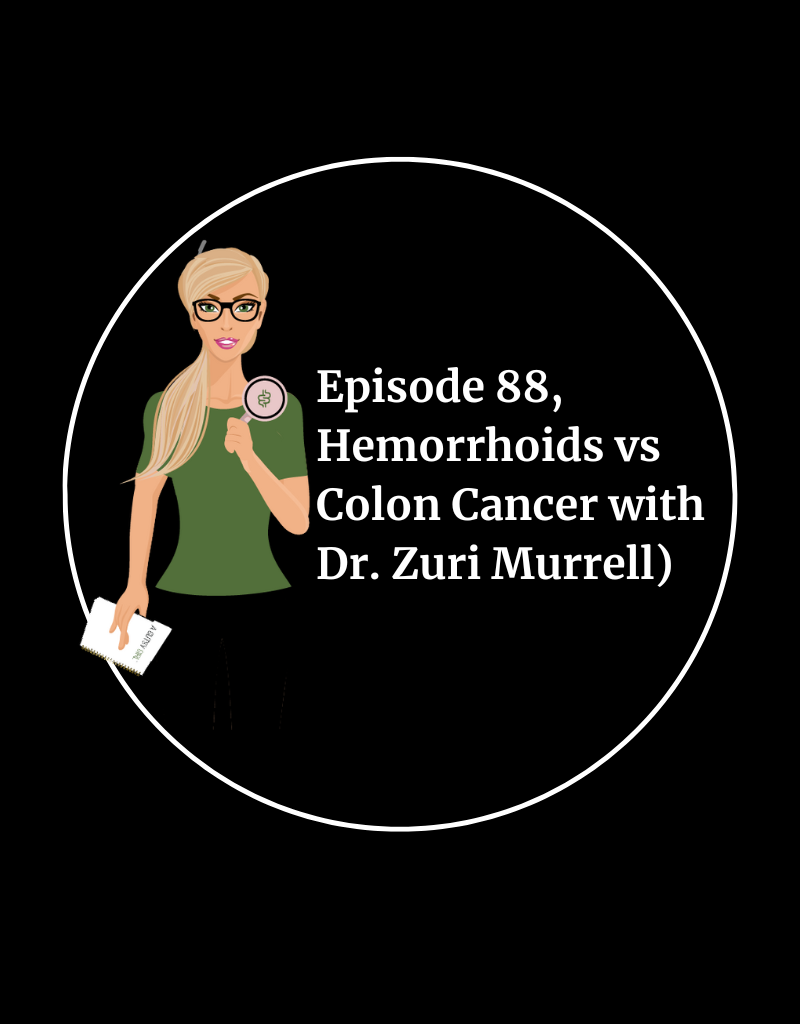
Episode 88 on the ‘A Gutsy Girl’ podcast: Hemorrhoids vs Colon Cancer with Dr. Zuri Murrell).
Today’s episode is bound to make you think, and is filled with real-life applications, thoughts, and more from a leading Los Angeles Colorectal Surgeon & Specialist.
Listen to Episode:
Subscribe Today:
Apple Podcasts | Google Podcasts | Spotify | iHeart Radio | RSS
In this Episode we cover:
- All about Colon Cancer vs Hemorrhoids
- What is the difference between seeing bright red blood and blood that’s darker/brown in color?
- How to prevent Colon Cancer
- Why are we seeing colon cancer rates and gut health issues as a whole on the rise?
Links & Resources Mentioned in this Episode:
- Follow Dr. Zuri on Instagram
- Reduce inflammation – get More Omega HERE for your complete dose of Omega 3 fatty acids (EPA + DHA) (code AGUTSYGIRL at checkout will save you 15%)
- Track the status of your OWN gut microbiome with Viome {Use code AGUTSYGIRL at checkout to save $110 off your own testing kit OR get $30 off your first month on one of their monthly health plans.}
- A Gutsy Girl’s journal
Episode Images
More about the A Gutsy Girl Podcast
A Gutsy Girl is the podcast that teaches, preaches, and celebrates healing the gut and living a happier, healthier life.
Subscribe On:
More episodes you might enjoy:
You shouldn’t die from fear and you shouldn’t die from embarrassment.
Dr. Zuri Murrell, on getting a colonoscopy
What To Look Out For:
- Why is Dr. Zuri so passionate about colon health?
- Are there some common factors or demographics that Dr. Zuri tends to see in his practice? If so, what are they?
- And why are we seeing colon cancer rates and gut health issues as a whole on the rise?
- Let’s talk about blood in the stool. When we see a bloody stool, it’s obviously concerning. Can you share the most common reasons for blood in the stool?
- What is the difference between seeing bright red blood and blood that’s darker/brown in color?
- While blood during a bowel movement is concerning in and of itself, what would be some other signs and symptoms that something more serious is going on?
- I want to break down 4 areas for concern that seem to be common in this community: irritable bowel syndrome, inflammatory bowel disease, hemorrhoids and colon cancer. Can you speak to each of them a little – what unites them, and what are some factors / symptoms that differentiate them?
- Can you share your top 3 tips around prevention? What can we do to prevent these common, but very serious, bowel issues?
- What are the best regular screenings to consider?
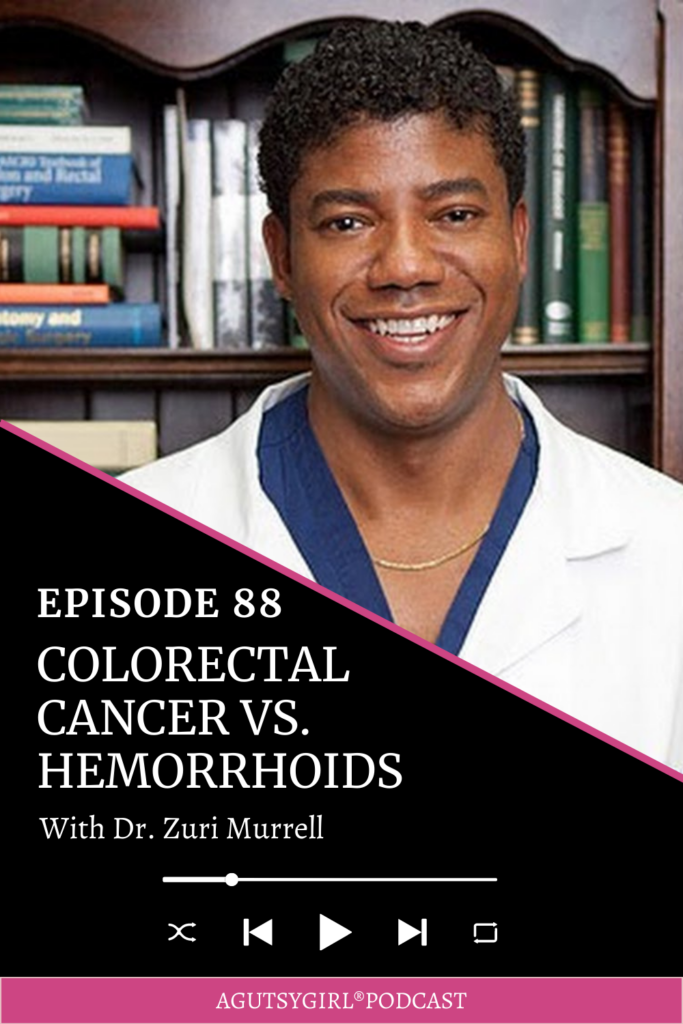
What is Colorectal Cancer?
Colorectal cancer is a type of cancer that is formed from polyps in the colon, otherwise known as the large intestine.
These polyps (or small bundles of cells) are initially harmless but can turn cancerous if not detected in time. They grow on the lining of the colon and can become further inflamed, leading to dangerous and potentially fatal outcomes.
One great thing about colon cancer that Dr. Zuri mentions is that it is both PREVENTABLE and TREATABLE if caught on time.
However, it can be hard to distinguish if your symptoms are due to this condition or not, due to their rather vague nature.
Symptoms of Colorectal Cancer
As mentioned before, the symptoms of colorectal cancer often cross over with other diseases such as hemorrhoids or IBD. The similar symptoms can often lead to prolonged diagnosis time, which furthers the cancer risk.
The key, as Dr. Zuri mentions on the podcast, is monitoring how long your symptoms last. If you have any of the following symptoms for over a month, it is necessary to speak to your healthcare provider about screening.
Here are the signs of colon cancer:
- rectal bleeding (can be persistent bleeding)
- changes in bowel habits
- persistent abdominal pain
The key is truly knowing if these symptoms are SUSTAINED or a one-off situation.
Since colon cancer symptoms are ones that almost everyone faces, you do not need to freak out every time it happens. However, if they continuously occur, it is 100% time to see a doctor.
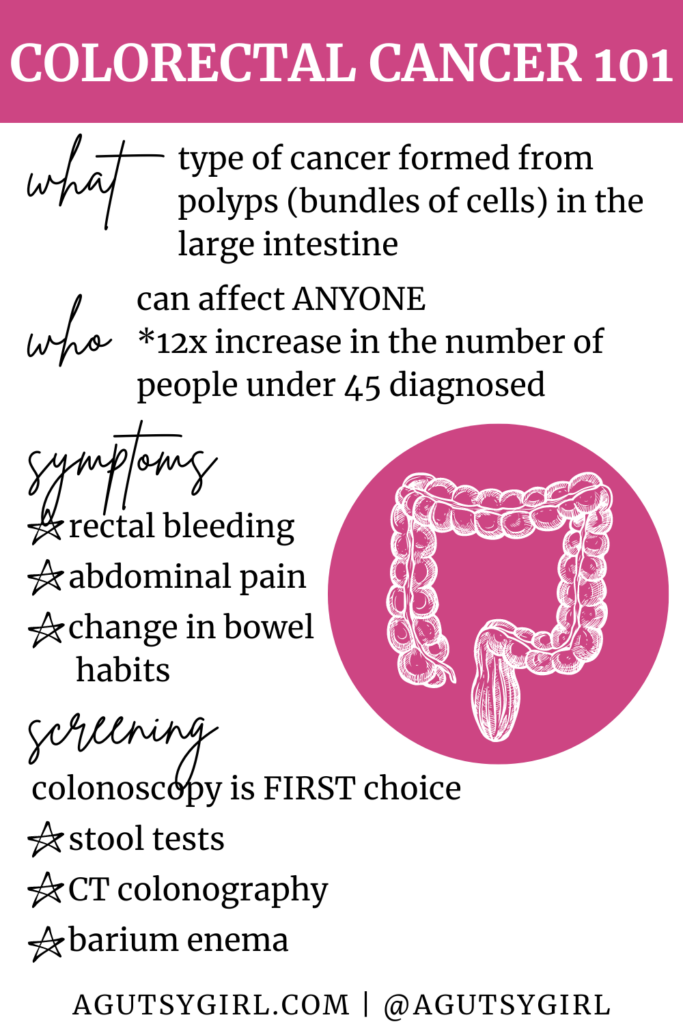
What About Hemorrhoids?
Hemorrhoids are another anal issue that can have very similar symptoms to colorectal cancer including rectal bleeding. They are the most common cause of rectal bleeding and are very common.
Hemorrhoids are enlarged blood vessels that can be found both inside our anus and outside. The internal hemorrhoids are ones that we all have, believe it or not! They help us to keep poop inside of our body until we are ready to go.
External hemorrhoids are often due to straining while defecating and they can be painful and cause irritation of the skin.
Hemorrhoid symptoms include:
- anal itching
- swelling
- rectal bleeding
- rectal pain
If you are having rectal bleeding, you can always try over the counter treatments for hemorrhoids and see if it helps.
Other hemorrhoid treatments include rubber band ligation, a procedure that can be done by a colorectal surgeon. If it does not improve fairly quickly, this could be one of the warning signs for something more serious.
Colon Cancer Screening
Contrary to what some doctors may tell you, a colonoscopy is the ONLY way to fully diagnose cancerous polyps in the colon.
This is what you should advocate for if you are experiencing any concerning symptoms for long periods.
A colonoscopy is a procedure in which a small camera is inserted into your anal area in order to see the entirety of your colon. While it may sound painful, you go under anesthesia, and it is completely painless.
Unfortunately, there are reasons why this may not be an option for some people. If this is not a feasible option you can turn to stool testing, which can be helpful for diagnosing ACTIVE cancer. However, it will not help you find pre-cancerous polyps.
Note: the colonoscopy can diagnose different conditions, including crohn’s disease and ulcerative colitis, not just colon cancer. My goal is to get you to the colonoscopy finish line. And so I put together a huge FAQ on the colonoscopy and endoscopy procedure with my best tips and tricks.
Here are some of these screening tests:
- stool test (FIT)
- stool test (cologuard)
- ct colonography
- barium enema
However, COLONSCOPY IS THE BEST OPTION.
Always push for this if you can. In its early stages, which the colonoscopy can detect, these colon polyps can be entirely removed.
Colorectal Trend in Younger Population
Unfortunately, colorectal cancer is on the rise in the younger population. While it used to be a primary issue over the age of 65, it is now affecting more and more young patients.
Today there is a 12x increase in the number of people under 45 who have colon cancer.
This alone should be a bit of a call to action that something needs to change.
Why So Young?
Colorectal cancer is thought to be affecting younger patients for some specific reasons.
1. processed diet
As most of us Gutsy girls know, processed foods are HIGHLY inflammatory.
Dr. Zuri mentions that 75% of the diet of young people in the US is processed foods. 75%!!!
This inflammation can cause polyps to form, which can later turn into cancer cells.
2. obesity
Obesity is another risk factor for colorectal cancer, which is affecting more and more young people in our country.
Fat cells actually give off inflammatory markers, which increases inflammation levels throughout the whole body. This leads to an increased risk of developing a polyp.
3. vitamin D deficiency
Naturally we get our vitamin D from the sun, but since C$%ID, many more people are hesitant to go out and about.
Vitamin D is anti-inflammatory and helps to protect against cancer, making it a crucial vitamin to fight colorectal issues.
4. diets high in red meat
Unfortunately for all my steak lovers out there, a diet high in red meat is a risk factor for colorectal cancer. This includes steak, pork, beef, and lamb.
Other risk factors include a family history of colorectal cancer, but this only makes up about 8% of those affected.
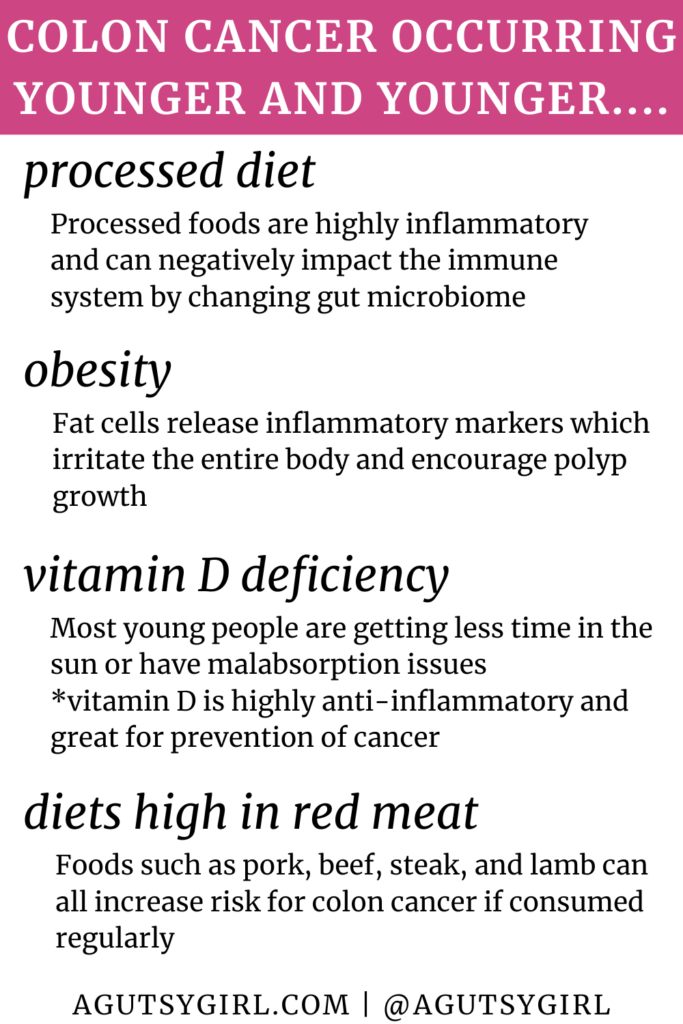
Gut Microbiome and Processed Foods
Highly processed foods actually change our gut microbiome, which affects our immune system. The gut is one of the most important immune organs in our body, helping to fight against diseases and viruses, such as cancer.
By eating processed foods, we not only increase the level of inflammation in our body, but we also decrease the efficacy of our immune system.
Talk about two birds with one stone!
How Can I Prevent Colon Cancer?
The good news is that there are so many ways to help prevent colon cancer.
1. eating an unprocessed diet
The first step might simply be to start consuming far fewer processed foods.
This can help lower inflammation and prevent negative microbiota changes.
2. eating a diet high in fiber
Fiber is CRITICAL for preventing colorectal cancer and a low-fiber diet, while trendy, is not helping.
Fiber helps to speed up colonic transit time, or the time in which foods moves through the large intestine.
This prevents food from sitting in the colon and releasing toxins, which can cause inflammation.
You can include fiber supplements in your diet or opt for high fiber food options such as berries, whole grains, beans, nuts, and brown rice.
3. taking a vitamin D supplement or prioritizing time in the sun
Ensure that your vitamin D needs are being taken care of, especially if you have gut issues.
Gut issues can impair absorption, so it may be a good idea to get your micronutrient levels tested.
4. moving your body
Can help to prevent excess fat cells and the release of inflammatory markers.
More from A Gutsy Girl
Want to learn even more about the gut and ways to heal it?
The best way to learn all the secrets is via my signature book, A Gutsy Girl’s Bible: a 21-day approach to healing the gut. Grab your copy on Amazon HERE.
- Welcome to A Gutsy Girl Podcast
- Hang out on Instagram
- BFF’s on YouTube
- Free resource: The Master Gutsy Spreadsheet
- Rated-G Email Club
Wrap-Up
As always, a huge goal for this show is to connect with even more people. Feel free to send an email to our team at podcast@agutsygirl.com. We want to hear questions, comments, show ideas, etc.
Did you enjoy this episode? Please drop a comment below or leave a review on Apple Podcasts.
Bio: Dr. Zuri Murrell
Zuri A. Murrell, M.D. is a leading Los Angeles Colorectal Surgeon & Specialist. Dr. Murrell is a Physician Member on the Board of Directors of Cedars- Sinai Medical Center.
Currently, Dr. Murrell serves as the Medical Director of Outreach and Quality Integration for Cedars-Sinai Medical Center. He is also a Chairman of the Cedars-Sinai Physician Medical Staff DEI Taskforce.
His previous positions included Director of the Colorectal Cancer Program (from 2012-2018), Clinical Chief of Colorectal Surgery (from 2012-2014), Chairman of the committee on the Samuel Oschin Comprehensive Cancer Institute (2019- 2022), and an Attending Surgeon at Cedars-Sinai Medical Center. Dr. Murrell has gained certification with the American Board of Colon & Rectal Surgery (since 2008) and the American Board of Surgery (since 2007).
With his own practices located in Beverly Hills & Los Alamitos, California – lacolonrectalsurgeon.com – and has over 40 publications including scientific book articles and book chapters.
He was the director of the Colorectal Cancer program at Cedars- Sinai Medical Center from 2010-2018. Dr. Murrell specializes in colon cancer, rectal cancer, hemorrhoids, Crohn’s Disease, Colitis, IBD Treatment, and Colonoscopies.
Also, the developer of Anal Rejuvenation™. Dr. Murrell is also an inventor scientist who holds a patent for a novel anorectal cream.
He enjoys educating the community on cancer prevention through nutrition and living a healthy lifestyle by giving lively, interactive, motivating educational seminars. He has educated audiences on television (The DRS, Hallmark Channel’s Home & Family, Telemundo, and various public service campaigns).
Find + connect with Dr. Zuri:
If you liked this post on colon cancer vs hemorrhoids, you might also enjoy:
Xox,
SKH
🤰 bloating be gone! weight loss through optimal gut health for women
💃ʜᴇᴀʟ ʏᴏᴜʀ ɢᴜᴛ. ʜᴇᴀʟ ʏᴏᴜʀ ʟɪfe.
🫶🏻 founder gutbyome.com

